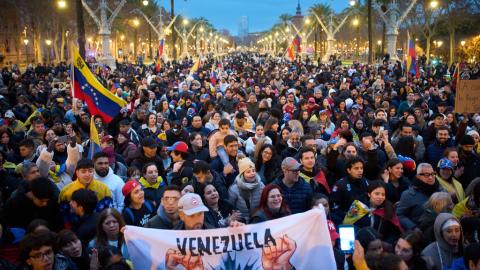Israel Boycott Resembles Nazi's 'Judenfrei'
LONDON -- The Nazis sought to rid Germany of any trace of the Jews. They called it "Judenfrei" or "Jew-free."
Some warn this same anti-Semitic spirit has returned today in a new form. It's a drive to erase any sign of Israel.
Across Europe, more and more campuses, cities and regions are trying to become "Israel-free zones," free of the taint of what Israel critics would call an "apartheid state."
Boycotting Israel
The Leicester City Council in England voted last year to boycott goods made in Israeli settlements in the West Bank (Judea and Samaria).
It's as if cities like Leicester want to cleanse themselves from Israeli impurity. And that reminds some of a very dark chapter in Europe's history: the Nazi drive to purify Germany of any trace of the Jews.
The city of Leicester declined our request for an on camera interview and issued this statement:
"Leicester City Council condemns anti-Semitism and all forms of racism and discrimination in the strongest possible terms. This is not a boycott of Israel by Leicester. The motion relates specifically to produce originating from illegal Israeli settlements in the West Bank."
While Leicester city government doesn't think it is being anti-Semitic, Jeffrey Kaufman, the former head of Leicester's progressive Jewish congregation, disagrees.
"The fact that the city has chosen to pick on Israel exclusively, with the exclusion of anything else, in my view makes it anti-Semitism," he said.
Other cities across Europe have gone further than Leicester. Last summer during the Gaza conflict, the Irish town of Kinvara went completely Israel-free: no Israeli products in stores or restaurants.
It's part of a movement called BDS -- Boycott, Divestment and Sanction -- but only against one nation: Israel.
Beyond BDS
Israeli musicians and actors have their performances disrupted by BDS protestors. An Ahava cosmetics store in London was picketed until it finally closed down. Ahava is an Israeli company. But the BDS movement will boycott any company that has dealings with Israel, including large multinationals like Coca-Cola and Nestle.
The anti-Israel boycott movement says it's not anti-Semitic, but they don't boycott any other nations.
Israel is a democracy. There are plenty of cruel dictatorships around the world they could boycott, but they don't.
"No other country. Just Israel. You won't see this against any other country in the world that they don't agree with," Richard Millet, who tracks the BDS movement through his website, said.
"They won't be calling for a boycott of America, which they don't agree with, or the British government, which they don't agree with, before we get into China, Russia, Syria, or Saudi Arabia," he continued. "You name it. All the other countries, there is no boycott. So you answer why?"
The BDS movement is taking over college campuses in Europe and America. Ronnie Fraser, a college lecturer and founding director of the Academic Friends of Israel, warns that the next generation of leaders is being brainwashed that Israel is the worst nation on earth.
"Britain's students are being fed a diet of 'Israel is a racist state. Israel is a Zionist state. Israel equals the Nazis," he said.
Fraser sued his own union, the University and College Union, for institutional anti-Semitism, saying it attempted an academic boycott of Israel that crossed the line into anti-Semitism.
He accused the BDS movement of "the de-legitimization of Israeli, the destruction of Israel."
Ignoring the Double Standard
According to European Union guidelines, the Israel boycott movement is anti-Semitic.
The EU says anti-Semitism includes, "Denying the Jewish people their right to self-determination, e.g., by claiming that the existence of a State of Israel is a racist endeavor," and by "applying double standards [to Israel]."
A new poll shows Britons now have a more favorable view of Iran than of Israel.
Polling also shows that more than half of British Jews feel they do not have a future in the United Kingdom. One in four have thought about leaving.
Jonathan Sacerdoti with the Campaign Against Anti-Semitism, which conducted some of the polling, said it reveals that British Jews are beginning to feel unwelcome.
"In the past two years, 56 percent agreed they had seen more anti-Semitism in the past two years than ever before," he said.
When you see a Jewish-owned shop, whether it be Israeli or not, it's still a Jewish-owned shop. When you see it targeted for boycotts and violence against the store itself, you can't not think that this is this exactly what happened in Nazi Germany; that they were boycotting Jewish-owned shops," Millet said.
In Germany, Nazi persecution of the Jews began with a boycott in April 1933. While some who are boycotting Israel may truly believe theyre only trying to help Palestinians, but to Jews, the goal of the Israel boycott is a destination similar to Nazi Germanys.
"People want to see the total destruction of Israel. When people say, from the river to the sea, that's what it means," "Mandy Blumenthal with the Campaign Against Anti-Semitism explained.
There are undoubtedly those in the Boycott, Divestment and Sanction movement who believe they are only trying to help Palestinians. But Jews see that the movement has a destination very similar to that of Nazi Germany.
The boycott movement wants the full right return of the Palestinians; "from the river to the sea," which means Israel would be erased. The Nazis would call it "Judenfrei" or "free of the Jews."
Dale Hurd also reported from Leicester, England.




